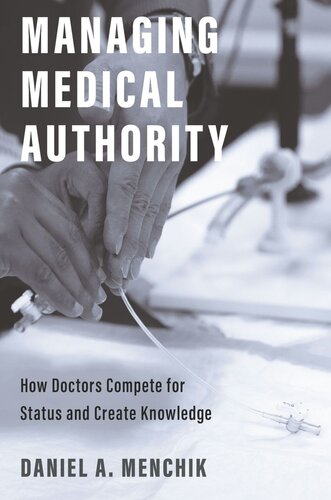

Most ebook files are in PDF format, so you can easily read them using various software such as Foxit Reader or directly on the Google Chrome browser.
Some ebook files are released by publishers in other formats such as .awz, .mobi, .epub, .fb2, etc. You may need to install specific software to read these formats on mobile/PC, such as Calibre.
Please read the tutorial at this link: https://ebookbell.com/faq
We offer FREE conversion to the popular formats you request; however, this may take some time. Therefore, right after payment, please email us, and we will try to provide the service as quickly as possible.
For some exceptional file formats or broken links (if any), please refrain from opening any disputes. Instead, email us first, and we will try to assist within a maximum of 6 hours.
EbookBell Team

4.8
104 reviewsHow the authority of medicine is continuously shaped by relationships among physicians, industry, colleagues, and organizations
Exploring how the authority of medicine is controlled, negotiated, and organized, Managing Medical Authority asks: How is knowledge shared throughout the profession? Who makes decisions when your heart malfunctions—physicians, hospital administrators, or private companies who sell pacemakers? How do physicians gain and keep their influence? Arguing that medicine’s authority is managed in collegial competition across venues, Daniel Menchik examines the full range of stakeholders driving the direction of the field: medical trainees, clinicians, researchers, administrators, and even the corporations that develop groundbreaking technologies enabling longer and better lives.
Menchik takes us into Superior Hospital to witness surgeries and executive negotiations. He moves outside the hospital to watch professional committees craft standards for treatments, case management, and professional ethics. At industry-sponsored meetings, he observes company representatives who train some experienced doctors on their technologies, while deterring others who they think might injure patients. Using an innovative ethnographic approach tying individual actions and their collective consequences, he considers how stakeholders ally across the various venues of medicine, even as they are sometimes pressed into competition within those venues. Menchik finds that these alliances and rivalries strengthen the authority of medicine as a whole. From place to place, and group to group, we see how a medical specialty renews and reinvigorates itself.
Beginning within the walls of the hospital, and moving to the professional and commercial venues that shape it, Managing Medical Authority offers an agenda-setting take on the social organization of medical authority.